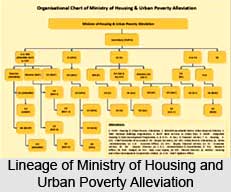 The Ministry of Urban Employment and Poverty Alleviation is the apex authority of Government of India at the national level to formulate policies, sponsor and support programme, coordinate the activities of various Central Ministries, State Governments and other nodal authorities and monitor the programmes concerning all the issues of urban employment, poverty and housing in the country. In the Federal structure of the Indian polity, the matters pertaining to the housing and urban development have been assigned by the Constitution of India to the State Governments of India. The Constitutions (74th Amendment) Act have further delegated many of these functions to the urban local bodies. The constitutional and legal authority of the Government of India is limited only to Delhi and other Union Territories and to the subject which State Legislatures authorize the Union Parliament to legislate.
The Ministry of Urban Employment and Poverty Alleviation is the apex authority of Government of India at the national level to formulate policies, sponsor and support programme, coordinate the activities of various Central Ministries, State Governments and other nodal authorities and monitor the programmes concerning all the issues of urban employment, poverty and housing in the country. In the Federal structure of the Indian polity, the matters pertaining to the housing and urban development have been assigned by the Constitution of India to the State Governments of India. The Constitutions (74th Amendment) Act have further delegated many of these functions to the urban local bodies. The constitutional and legal authority of the Government of India is limited only to Delhi and other Union Territories and to the subject which State Legislatures authorize the Union Parliament to legislate.
However, the provisions of the Constitution notwithstanding, the Government of India plays a much more important role and exercise a larger influence to shape the policies and programmes of the country as a whole. The National Policy issues are decided by the Government of India which also allocates resources to the State Governments through various Centrally Sponsored schemes, provides finances through national financial institutions and supports various external assistance programmes for housing and urban development in the country as a whole. Policies and programme contents are decided at the time of formulation of Five Year Plans. The indirect effect of the fiscal, economic and industrial location decisions of the Government of India exercise a far more dominant influence on the pattern of urbanisation and real estate investment in the country. Thus the Ministry at the Central level plays a rather important role in this field.
The Ministry was constituted on 13th May, 1952 when it was known as the Ministry of Works, Housing and Supply. Subsequently it was renamed as Ministry of Works and Housing when a separate Ministry of Supplies came up. The name of the Ministry was changed to Ministry of Urban Development in September, 1985 in recognition of the importance of urban issues. With the creation of a separate Department of Urban Employment and Poverty Alleviation on 8th March, 1995, the Ministry came to be known as the Ministry of Urban Affairs and Employment. The Ministry had two Departments: Department of Urban Development and Department of Urban Employment and Poverty Alleviation. The two Departments were again merged on 9th April, 1999 and in consequence thereto, the name has also been restored to The Ministry of Urban Development. This Ministry was bifurcated into two Ministries viz. (i) Ministry of Urban Development and (ii) Ministry of Urban Employment and Poverty Alleviation with effect from 16.10.1999. These two Ministries were again merged into one Ministry on 27.5.2000 and named as Ministry of Urban Development and Poverty Alleviation with two Departments. They are (i) Department of Urban Development and (ii) Department of Urban Employment and Poverty Alleviation.
From 27-5-2004, the Ministry has again been bifurcated into two ministries viz: (i) Ministry of Urban Development; and (ii) Ministry of Urban Employment and Poverty Alleviation.
Functions of Ministry of Housing and Urban Poverty Alleviation
The following responsibilities fall within the purview of the Ministry of Housing and Urban Poverty Alleviation:
1. Formulation of housing policy and programme (except rural housing which is assigned to the Department of Rural Development), review of the implementation of the Plan Schemes, collection and dissemination of data on housing, building materials and techniques, general measures for reduction of building costs and nodal responsibility for National Housing Policy.
2. Human Settlements including the United Nations Commission for Human Settlements and International Cooperation and Technical Assistance in the field of Housing and Human Settlements.
3. Urban Development including Slum Clearance Schemes and the Jhuggi and Jhonpri Removal Schemes. International Cooperation and Technical Assistance in this field is also secured by the Ministry.
4. National Cooperative Housing Federation.
5. Implementation of the specific programmes of Urban Employment and Urban Poverty Alleviation including other programmes evolved from time to time.
6. All matters relating to Housing and Urban Development Corporation (HUDCO) other than those relating to urban infrastructure.




















